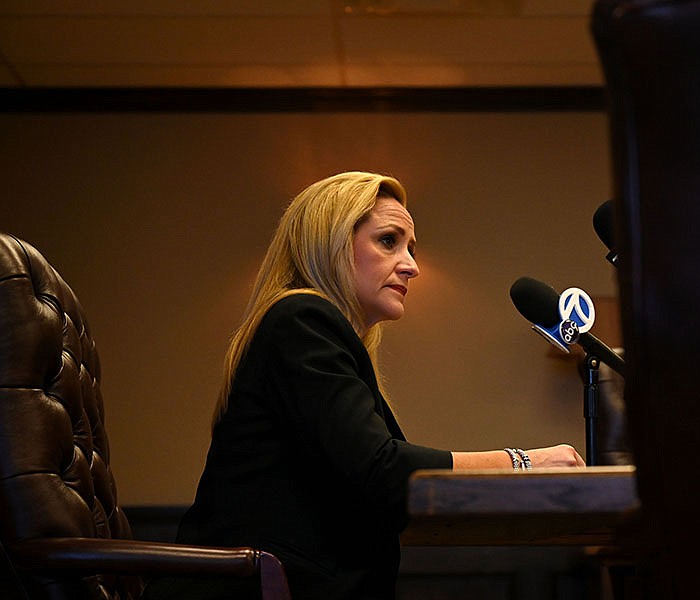The Arkansas Supreme Court ruled Thursday that an attorney general cannot be sued for the way they run their office unless malicious intent can be proven.
The case that came before the Arkansas Supreme Court was centered around a lawsuit against Attorney General Leslie Rutledge in both her official and individual capacities.
The dispute focuses on Rutledge’s spending on TV commercials and legal filings in out-of-state federal litigation.
The high court ruled that the attorney general has sovereign immunity and cannot be enjoined because the plaintiffs failed to show that any of the attorney general’s acts were beyond her legal power. The court also ruled that Rutledge as an individual is entitled to statutory immunity because the plaintiffs failed to allege that she acted maliciously.
Both claims for injunctive relief were then reversed and dismissed by the court.
The Supreme Court also ruled that the official capacity claim for illegal exaction is not subject to either sovereign or statutory immunity.
“We therefore dismiss this part of the appeal because it falls outside our appellate jurisdiction on interlocutory review,” Justice Rhonda Wood said in the ruling.
The illegal-exaction claim against Rutledge in her official capacity remains the sole surviving claim upon remand.
“Still, this is not because we have found the claim to have merit but because we cannot evaluate merits at this point,” Wood said. “Further, the Attorney General’s absolute immunity motion remains outstanding.”
A group of Arkansas taxpayers, most of them from Little Rock, banded together to sue Rutledge, claiming she abused her authority — and illegally spent tax money to do so — to promote her own political ambitions.
According to the lawsuit, the plaintiffs generally objected to the decisions Rutledge has made while in office.
The group stated the attorney general filed briefs in national litigation “notwithstanding the absence of credible facts or legal precedence [sic] to support the claims . . . and without consult[ing]” the Governor or other state agency leaders.
Examples of these cases include the NRA’s bankruptcy case in Texas federal court; a lawsuit about the NRA’s nonprofit status in the New York federal court and a request to intervene in an original action in the United State Supreme Court about the 20202 presidential election.
The plaintiffs alleged the filings did not involve any state interests and were made only to further the attorney general’s political ends.
The plaintiffs also alleged that Rutledge spent public funds on television and radio advertisements about consumer education that constituted an illegal exaction under the Arkansas Constitution and exceeded her statutory authority.
Lastly, the plaintiffs alleged the attorney general exceeded her duties and committed an illegal exaction by engaging in partisan activities, such as serving as national co-chair of "Lawyers for Trump!" and elevating political causes through social media.
"Her activities and highly partisan statements, tweets, and media postings have clearly indicated that...Rutledge is an Attorney General who represents only those who agree with her political view points," the lawsuit stated.
Rutledge has argued that since the attorney general position was established by the Arkansas Constitution, sovereign immunity means she cannot be sued. Further, with her duties established by law, Rutledge’s lawyers assert that, absent proof of wrongdoing, the courts cannot tell the attorney general how to operate — the only people who can put restrictions on the authority of the position are legislators, who write the law, and the voters, who decide who holds the office.
The Arkansas Supreme Court said a lawsuit against a state official for injunctive relief can overcome sovereign immunity if the suit adequately pleads the official acted illegally, unconstitutionally, or ultra vires.
The court ruled that the plaintiffs failed to present sufficient facts to overcome sovereign immunity on this issue.
“None of the facts and legal allegations established that the Attorney General exceeded any legal authority,” Wood said in the ruling.
The plaintiffs also brought an illegal-exaction claim against Rutledge in her individual capacity where they demanded she alone be ordered to repay the state treasury.
Rutledge argued statutory or “qualified” immunity shields her from illegal-exaction lawsuits for acts occurring within the course and scope of employment.
“Again the circuit court should have summarily dismissed the individual-capacity claims as plaintiffs failed to meet their pleading burden to surmount statutory immunity,” Wood said.
The state Supreme Court determined that since the circuit court failed to rule on absolute immunity they were not able to dismiss the illegal-exaction claim because it was not appealable.
